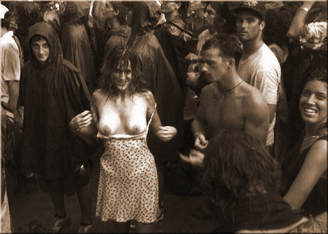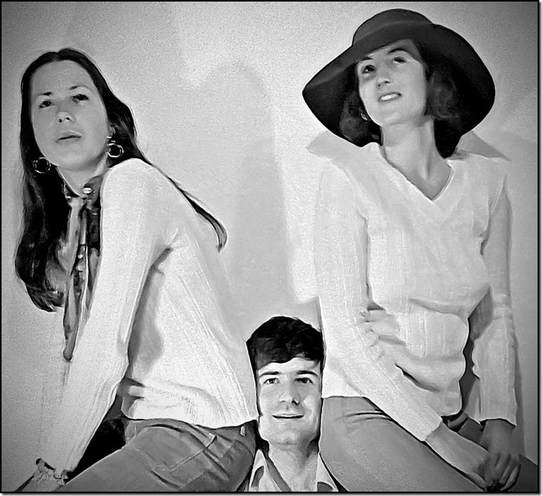 'Feminism', Sixties Style
'Feminism', Sixties Style One advantage of growing older (okay then, old) is the first-hand memory of events that younger people can only read or hear about. A good documentary, assuming there is such a thing as an unbiased one, can be very informative but to have an overall picture of an era it is also important to know the sequence of events and how they are linked to each other. Not to possess the knowledge of this linkage can allow people with agendas of their own to give a false picture of an era and how we arrived where we are now.
This has been brought home to me by the recent Westminster ‘groping’ and 'touching' allegations, not that I intend to comment specifically on those in the present fog. In recent days, however, there has been a repetition of the charge that the problem is entirely with men (from the context, heterosexual men) and their alleged sense of entitlement. ‘It’s all about men,’ one female MP asserted in a news interview. ‘They have been praised all their lives and think they can get away with anything’. Apart from speculating about what she would have said if such a broad insult had been directed at women by a male MP (I suspect he would not have lasted in post for long), I have to say that my memory of the relationship between men and women over the last fifty years does not really confirm her assertion. Could it be that her confidence that she could say such a thing without challenge has something to do with her own sense of entitlement?
Not that I have any particular interest in defending heterosexual men. As a gay man I was usually just an observer during the shenanigans between heterosexual males and females over the last fifty years (I had an oppression of my own to contend with, though I’ll save all that for another post), but I was acquainted with enough of both to remember how things developed. Yes, up to the 1960s males did often make the first move, but that was expected on both sides and a man who held back would be considered weird by many, perhaps most, women. In the Sixties (though I will add the proviso that change did not come at the same pace for everyone), the beginnings of modern feminism coincided with what was dubiously described as the sexual revolution, and initially many ‘liberated’ women were very much into ‘free love’ as it was called among other things. At music festivals, at parties, on a trip to the seaside, whatever, it was a mark of the new liberation that women were entitled to the action as much as men. Males and females snogged, fondled, touched each other’s bums, and there were few fixed rules by either party about the etiquette of it, especially not after the marijuana had kicked in.
In the 1970s I was first at university in Norwich, then in flatshares when I worked in London. I was not ‘out’ then as it would have been very difficult especially for a shy lad like me, in fact in the civil service it would have been all but impossible. Yet at university and later at office Christmas parties or with female flatmates and other acquaintances, even a couple of times at the photocopying machine, I experienced the touching and groping from women which now, apparently, is supposed to say something about the awfulness of men. After my failure to respond I think it gradually dawned that I was gay, and once or twice it may even have been an attempt to confirm the rumours. Whatever the reason, sexual liberties were most certainly not confined to one gender. It was the new era, and 'feminism', albeit interpreted in varying ways, played a part in creating that atmosphere.
It was also in the 1970s, with the advent of campus feminism, that there seemed to be something of an about-turn, though it was to be some years before the new rules passed down to the masses and to photo-copying machines. It was not yet puritanism - that came later – but it was the beginning of the road that led to the rule that not only could women be the initiators of sexual contact, however mild, in practice it was only women who could be.
By all means let’s establish new rules of conduct, but they might be better obeyed if they are agreed in a mutual way rather than as a result of the latest gender theory from a particular faction, especially when the theory is infused with a strong dose of spite and an underlying assumption that injustices and insults directed at men cannot ever be as bad as those directed at women. As we approach Armistice Day, it might be worth remembering that many of those men with a ‘sense of entitlement’ in reality had no entitlement other than to be sent to die. They did it because from their earliest years they were taught (and it was mainly women who brought up boys in their formative years) that it was a man’s role to do that, just as it was (and is) mainly his role to do the risky jobs. When the world was a more dangerous place, and when work meant a mine or a leaky fishing vessel, ‘proper boys’ were needed to carry out the task.
This has been brought home to me by the recent Westminster ‘groping’ and 'touching' allegations, not that I intend to comment specifically on those in the present fog. In recent days, however, there has been a repetition of the charge that the problem is entirely with men (from the context, heterosexual men) and their alleged sense of entitlement. ‘It’s all about men,’ one female MP asserted in a news interview. ‘They have been praised all their lives and think they can get away with anything’. Apart from speculating about what she would have said if such a broad insult had been directed at women by a male MP (I suspect he would not have lasted in post for long), I have to say that my memory of the relationship between men and women over the last fifty years does not really confirm her assertion. Could it be that her confidence that she could say such a thing without challenge has something to do with her own sense of entitlement?
Not that I have any particular interest in defending heterosexual men. As a gay man I was usually just an observer during the shenanigans between heterosexual males and females over the last fifty years (I had an oppression of my own to contend with, though I’ll save all that for another post), but I was acquainted with enough of both to remember how things developed. Yes, up to the 1960s males did often make the first move, but that was expected on both sides and a man who held back would be considered weird by many, perhaps most, women. In the Sixties (though I will add the proviso that change did not come at the same pace for everyone), the beginnings of modern feminism coincided with what was dubiously described as the sexual revolution, and initially many ‘liberated’ women were very much into ‘free love’ as it was called among other things. At music festivals, at parties, on a trip to the seaside, whatever, it was a mark of the new liberation that women were entitled to the action as much as men. Males and females snogged, fondled, touched each other’s bums, and there were few fixed rules by either party about the etiquette of it, especially not after the marijuana had kicked in.
In the 1970s I was first at university in Norwich, then in flatshares when I worked in London. I was not ‘out’ then as it would have been very difficult especially for a shy lad like me, in fact in the civil service it would have been all but impossible. Yet at university and later at office Christmas parties or with female flatmates and other acquaintances, even a couple of times at the photocopying machine, I experienced the touching and groping from women which now, apparently, is supposed to say something about the awfulness of men. After my failure to respond I think it gradually dawned that I was gay, and once or twice it may even have been an attempt to confirm the rumours. Whatever the reason, sexual liberties were most certainly not confined to one gender. It was the new era, and 'feminism', albeit interpreted in varying ways, played a part in creating that atmosphere.
It was also in the 1970s, with the advent of campus feminism, that there seemed to be something of an about-turn, though it was to be some years before the new rules passed down to the masses and to photo-copying machines. It was not yet puritanism - that came later – but it was the beginning of the road that led to the rule that not only could women be the initiators of sexual contact, however mild, in practice it was only women who could be.
By all means let’s establish new rules of conduct, but they might be better obeyed if they are agreed in a mutual way rather than as a result of the latest gender theory from a particular faction, especially when the theory is infused with a strong dose of spite and an underlying assumption that injustices and insults directed at men cannot ever be as bad as those directed at women. As we approach Armistice Day, it might be worth remembering that many of those men with a ‘sense of entitlement’ in reality had no entitlement other than to be sent to die. They did it because from their earliest years they were taught (and it was mainly women who brought up boys in their formative years) that it was a man’s role to do that, just as it was (and is) mainly his role to do the risky jobs. When the world was a more dangerous place, and when work meant a mine or a leaky fishing vessel, ‘proper boys’ were needed to carry out the task.

 RSS Feed
RSS Feed